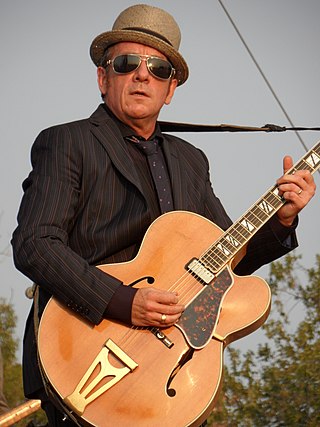
Declan Patrick MacManus, known professionally as Elvis Costello, is an English singer, songwriter, record producer, author and television presenter. Per Rolling Stone, Costello "reinvigorated the literate, lyrical traditions of Bob Dylan and Van Morrison with the raw energy and sass that were principal ethics of punk", noting the "construction of his songs, which set densely layered wordplay in an ever-expanding repertoire of styles." His first album, My Aim Is True (1977), is widely regarded as one of the best debuts in popular music history. It spawned no hit singles, but contains some of Costello's best-known songs, including the ballad "Alison". Costello's next two albums, This Year's Model (1978) and Armed Forces (1979), recorded with his backing band the Attractions, helped define the new wave genre. From late 1977 through early 1980, each of the eight singles he released reached the UK Top 30. His biggest hit single, "Oliver's Army" (1979) sold more than 400,000 copies in Britain. He has had more modest commercial success in the US, but has earned much critical praise. From 1977 through the early 2000s, Costello's albums regularly ranked high on the Village Voice Pazz & Jop critics' poll, with This Year's Model and Imperial Bedroom (1982) voted the best album of their respective years. His biggest US hit single, "Veronica" (1989), reached number 19 on the Billboard Hot 100.
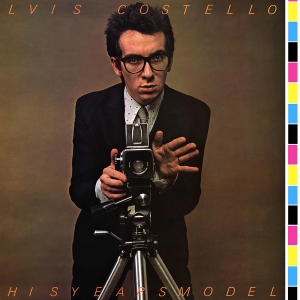
This Year's Model is the second studio album by the English singer-songwriter Elvis Costello, released on 17 March 1978 through Radar Records. After being backed by Clover for his debut album My Aim Is True (1977), Costello formed the Attractions—keyboardist Steve Nieve, bassist Bruce Thomas and drummer Pete Thomas —as his permanent backing band. Recording sessions took place at London's Eden Studios in eleven days between late 1977 and early 1978. Nick Lowe returned as producer, and Roger Béchirian acted as engineer. Most of the songs were written prior to the sessions, and debuted live during the latter half of 1977.
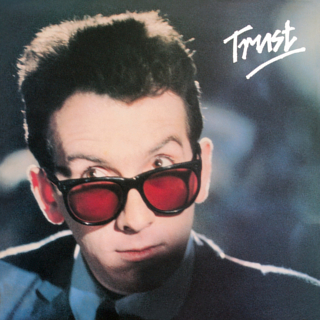
Trust is the fifth studio album by the English singer-songwriter Elvis Costello, and his fourth with the Attractions—keyboardist Steve Nieve, bassist Bruce Thomas and drummer Pete Thomas. It was released on 23 January 1981 through F-Beat Records in the United Kingdom. His fifth consecutively produced album by Nick Lowe, who was assisted by engineer Roger Béchirian, the album was recorded in London from October to November 1980 between DJM and Eden Studios. The sessions were riddled with alcohol and drug issues and tensions were high between the band members. Squeeze vocalist Glenn Tilbrook and the Rumour guitarist Martin Belmont made guest appearances on "From a Whisper to a Scream".

Blood & Chocolate is the eleventh studio album by the English singer-songwriter Elvis Costello, released in 1986 through Demon Records (UK) and Columbia Records (US). It is his ninth album with his long-standing backing band the Attractions. After his previous album King of America with producer T-Bone Burnett and different musicians, this album reunited him with producer Nick Lowe and his usual backing group the Attractions.

King of America is the tenth studio album by the English singer-songwriter Elvis Costello, released on 21 February 1986. Co-produced by Costello and T Bone Burnett, the album originated following a series of tours the two made under the name "the Coward Brothers". Recording took place in mid-1985 at various studios in Los Angeles, California, with a group of American session musicians dubbed "the Confederates". Selected by Burnett, they included Ray Brown, Earl Palmer and former members of Elvis Presley's TCB Band. Costello's regular backing band, the Attractions, were intended to appear on half of the album before poor sessions led to them appearing on only one track, "Suit of Lights".
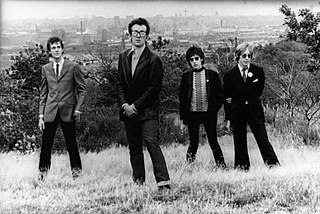
The Attractions were an English backing band for the English new wave musician Elvis Costello between 1977 and 1986, and again from 1994 to 1996. They consisted of Steve Nieve (keyboards), Bruce Thomas, and Pete Thomas (drums). They also released one album as an independent entity, without Costello, in 1980.
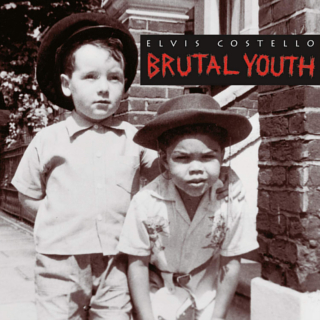
Brutal Youth is an album by English musician Elvis Costello, released in 1994. It contains the first recordings Costello made with his band the Attractions since Blood and Chocolate (1986). Brutal Youth was the third, and most recent of Costello's albums, to peak at number two in the UK Albums Chart, following on from Armed Forces (1979) and Get Happy!! (1980).

"Pump It Up" is a 1978 song by Elvis Costello and the Attractions. It originally appeared on Costello's second album This Year's Model, which was the first he recorded with the backing group the Attractions. Written as an ironic response to his time during the Stiffs Live Tour and inspired by "Subterranean Homesick Blues" by Bob Dylan, "Pump It Up" features a stomping rhythm and ironic lyrics.
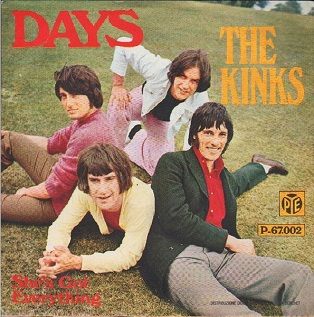
"Days" is a song by the English rock band the Kinks, written by Ray Davies. It was released as a non-album single in June 1968. It also appeared on an early version of the album The Kinks Are the Village Green Preservation Society. It now appears as a bonus track of the remastered CD. On the original Pye 7N 17573 label, the name of the song is "Day's" owing to a grammatical error.

"Watching the Detectives" is a 1977 single by English singer-songwriter Elvis Costello. Inspired by the Clash and Bernard Herrmann, the song features a reggae beat and cynical lyrics.
"Leave My Kitten Alone" is a song written by Little Willie John, Titus Turner, and James McDougal, first recorded by Little Willie John and released in 1959 as a single through King Records. It is an R&B song that follows a 24-bar blues format.

"Everyday I Write the Book" is a song written by Elvis Costello, from Punch the Clock, an album released in 1983 by Elvis Costello and the Attractions. It peaked at 28 on the UK Singles Chart and was their first top 40 hit single in the U.S., peaking at No. 36 on the Billboard Hot 100.

"(I Don't Want to Go to) Chelsea" is a song written by new wave musician Elvis Costello and recorded by Costello with his backing band the Attractions. The song appeared on Costello's 1978 second album, This Year's Model. Written by Costello while working as a computer programmer, the song was lyrically inspired by films Costello had been watching as well as childhood trips to Chelsea. Musically the song featured influence from bands such as the Who and the Kinks and is notable for Bruce Thomas's prominent bassline.

"Sulky Girl" is a song written and performed by new wave musician Elvis Costello that was first released on his 1994 album Brutal Youth. The song was one of those on the album that featured Costello performing with his longtime backing band the Attractions, who reunited during the course of the album's recording. As such, Costello singled out the song as an instance of the band's ability to play loudly and aggressively.

"13 Steps Lead Down" is a song written and performed by new wave musician Elvis Costello that was first released on his 1994 album Brutal Youth. Written quickly during a day-long session, the song features lyrics referencing El Escorial and the twelve-step recovery movement. The track is one of those on Brutal Youth that features the reunited Attractions, Costello's longtime backing band.

"I Want You" is a song written by Elvis Costello and recorded with his backing band the Attractions. It was released on his 1986 album Blood & Chocolate.
"Complicated Shadows" is a song written by new wave musician Elvis Costello and recorded by Costello with his backing band the Attractions. The song appeared on Costello's 1996 album, All This Useless Beauty.
"London's Brilliant" is a song by former Transvision Vamp lead singer Wendy James. It was released in 1993 as the second single from her debut solo album Now Ain't the Time for Your Tears and was written by Elvis Costello and his then wife Cait O'Riordan. The single was unsuccessful upon release, peaking at a low number sixty-two on the UK Singles Chart.
"Welcome to the Working Week" is a song written by and first recorded by Elvis Costello in 1977 for his debut album My Aim Is True. A sardonic comment on the working life aimed at a more privileged woman, the song features a brief runtime and unpolished production. Released as the B-side to "Alison", the song has since attracted critical acclaim from music writers.
"The Other End (Of the Telescope)" is a song by American band 'Til Tuesday, which was released in 1988 on their third and final studio album Everything's Different Now. The song was written by Aimee Mann and Elvis Costello. Costello recorded his own version of the song for his 1996 album All This Useless Beauty.















